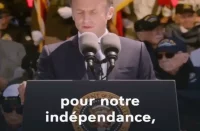If one were to describe United States President Barack Obama’s long-awaited policy speech on the upheaval in the Middle East, it is best done in the hackneyed phrase – ‘old wine in new bottle’. The US hopes to harness the Arab Spring to perpetuate its geopolitical dominance in the Middle East. Obama’s speech betrays that the US’ interests invariably trump its professed ‘values’…
Obama froze the assets of Libya’s Muammar Gaddafi and of Syrian leader Bashar Al-Assad. But what about the multi-trillion dollar worth of petrodollar loot kept in the vaults of western banks by the Arab despots? Obama sees the Middle Eastern winds for democratic reforms sweeping over only seven countries – Tunisia, Egypt, Libya, Syria, Iran, Yemen and Bahrain.
He saw them for sure over the Egyptian pyramids but then his eyes looked over Gaza and Lebanon and the Dead Sea and the Hashemite kingdom. Obama can next see the Arab revolutionary winds only as they begin descending on Syria. Stunningly, Obama can’t see any trace of the great Middle Eastern winds appearing on the sand dunes of the Arabian Peninsula though the Gulf of Aqaba is within his eyesight.
From Syria, Obama sees the winds making a sharp detour to the east and swiftly crossing Mesopotamia to appear, lo and behold, over Iran. And after ransacking Iran, Obama sees the Arab revolutionary winds crossing over to Bahrain – contemptuously ignoring Saudi Arabia, Kuwait, Qatar and the United Arab Emirates. When they takeoff from Bahrain, it is to disappear into the blue sea and then make a perfunctory appearance in Yemen. With Yemen, it is all over. The Arab winds of change apparently dissipate into thin air.
The big kings and their little princes and little princesses and the sheikhs who were trembling with dark fears for the past 100 days would be feeling relieved that according to the American gospel, the Arab revolution targets only 20th century republican states – not medieval monarchies.
Shorn of the high-flown rhetoric, the sum and substance of what Obama presented can be put down as follows:
– Having been taken by surprise initially, the US will now set about tempering the democratic revolutions in Tunisia and Egypt.
– The bottom line in Libya is regime change.
– Bashir Al-Assad of Syria, too, must give up power. He can quit or will be ousted.
– The US will not recognise the democratic legitimacy of ‘non-state actors’ Hezbollah and Hamas.
– The US will robustly pursue its containment strategy toward Iran.
– The stabilisation of Bahrain, where US’ Fifth Fleet is anchored, is vital and that seems only possible by reconciling the Shi’ite opposition.
– The US supports the transfer of power in Yemen brokered by Saudi Arabia.
How does Obama estimate the dimensions of the Middle East upheaval? He is categorical that it is a “story of self-determination”. However, change is not necessarily imminent. In some countries, change will be swift but in some other countries it may be gradual and “it will be years before this story reaches its end”.
How does America respond? Obama said the US will continue to pursue its “set of core interests” in the Middle East, namely, countering terrorism, nuclear non-proliferation, free trade regional security and Israel’s security and Arab-Israeli peace. He insists that the Arab peoples do not pose any challenge to the pursuit of America’s interests.
The add-ons in the US policies in the changed circumstances will be the following “core principles”:
– US will oppose the use of violence and repression against the people.
– US supports a set of universal rights – right to assemble and practice religion, gender equality, rule of law and representative rule – “whether you live in Baghdad or Damascus; Sanaa or Tehran”.
– Washington’s support for political and economic reform is going to be “translated into concrete actions” by using the diplomatic, economic and strategic tools at US’ disposal.
– This includes extensive networking, use of ‘smart power’ and providing assistance to civil society groups, “including those that may not be officially sanctioned”.
Obama presented a wholesome project to restructure the US’ economic ties with the new Middle East. “The goal must be a model in which protectionism gives way to openness; the reigns of commerce pass from the few to the many, and the economy generates jobs for the young… ensuring financial stability; promoting reform; and integrating competitive markets with each other and the global economy.” Washington has asked World Bank and International Monetary Fund to prepare a plan at next week’s G-8 summit on what needs to be done. The US will be writing off 1 billion dollars out of Egypt’s debts and will create Enterprise Funds on the pattern of support extended to the post-Soviet Eastern European economies for their transition and integration with the western world in the 1990s. The US also proposes to launch a Trade and Investment Partnership with the countries of the Middle East “to promote integration with US and European markets, and… to construct a regional trade arrangement”.
Obama made it clear at the very outset of his speech that US has got over its initial nervousness about the ascendancy of political Islam in the Middle East. The pragmatism in the cooperative attitudes of the Muslim Brotherhood in Egypt must have raised the US’ comfort level. Besides, the killing of Osama bin Laden and the overall degradation and weakening of al-Qaeda further strengthen the US assessment that any transformation in the region, if Islamic, would still be only on ‘moderately Islamic’ lines. Without doubt, on the basis of this confidence, the US is pitching for the democratic transformation of the Middle Eastern political order.
The caveat lies in the US’ order of pecking. Libya and Syria are the immediate targets for ‘regime change’. Egypt is central to Israel’s security and, therefore, must be fastened again as a strategic ally. The containment of Iran remains at the core of the US’ Middle East policy. The US seems to have given up hope of rupturing Syria-Iran alliance. Evidently, US is in no hurry at all to initiate ‘regime change’ in the GCC countries in the Persian Gulf. But Obama singled out Bahrain as a special case for immediate reforms. Why Bahrain, which is so staunchly ‘pro-US’? Several factors come into play. In terms of the criticality of Bahrain’s stability for the US’ Fifth Fleet’s operations, Washington estimates that the present situation is untenable and is a recipe for big trouble and turmoil in a near future.
The Bahrain king and the crown prince are inclined toward reform and reconciliation with the Shi’ite opposition but the Prime Minister, Sheikh Selam al Khalifa (king’s uncle) blocks reforms and the Saudis not only support his hard line approach but may have deliberately created a fait accompli through their own intervention in March precipitating a violent crackdown.
Contrary to what the Saudis propagate, US seems to estimate that the Bahraini Shi’ites do not really want an Iran-type Islamic regime. The Bahraini spiritual leader Sheikh Issa Qassem has openly opted for a constitutional monarchy rather than overthrow of the king. Most certainly, Washington has taken note that Tehran understands its limitations and is scrupulously non-interfering, its rhetorical posturing notwithstanding.
Again, the smaller GCC countries also harbour some disquiet about the Saudi intervention in Bahrain. Interestingly, Obama indirectly hinted more than once about his abhorrence of the Saudi ploy to stoke the fires of Sunni-Shi’ite sectarianism in the region. The point is, Bahraini Shi’ites draw inspiration from Iraq’s religious establishment rather than from Qom. Thus, US sees that Shi’ite empowerment in Bahrain can work to its regional advantage as well.
Obama’s ‘Syria challenge’ is going to be the main story in the coming weeks. Syria is very different from Libya in social formation. Syria has a well-entrenched political system, state apparatus and ideology. The regime has the will and capacity to resist predators from abroad. Moreover, Obama can’t swallow Syria in a single bite as a regime change in Syria could alter the entire Middle Eastern scene and throw Lebanon into great disarray. If one single thing in life can bring together Israel, Iran and Saudi Arabia on the same side, it is probably their singular aversion toward an overthrow of the Syrian regime by the western forces.
Unlike Gaddafi, al-Assad is a ‘popular’ regional figure, well-liked, modern, rational, sensible and well-mannered. In short, Obama is overreaching in his threat to turn Syria into another Libya. The big question is did he really mean what he said? If not, what is Plan B? Equally, he probably knew his remarks on the Israel-Palestine question did not break any new grounds. True, he spoke of a two state solution – Israel and Palestine – based on 1967 boundaries and involving swaps, but left delightfully vague his stance on the core issue of Israeli settlements, Palestinian refugees or the status of Jerusalem – and most important, how he proposes to steer a peace process in the face of Israeli obduracy, and what territories are to be ‘swapped’.
The Arab opinion cannot miss that US’ strategic commitment to Israel remains pivotal to its Middle East strategy. In sum, Obama’s speech lays out an agenda for the perpetuation of the West’s political, economic and cultural dominance in the Middle East, a region which was central to the US’s Cold War strategies and remains, if anything, more crucial than ever in the emergent world order, which is characterised by ‘multipolarity’ and Asia’s growing prominence – and within that, China’ rise as a world power.
The Arabs will see through the high-flown rhetoric and comprehend that the US is desperately trying to wrest control of their revolution…
Source: Strategic Culture Foundation














Anyone who has watched Barack Obama’s Jewish-funded political career closely, would say: “‘old wine in the same old bottle’.
I believe Barack Obama in his much advertised speech on May 19. 2011 – has tried to pre-empt Benji Netanyahu’s coming address to the joint session of Congress. In his address, Obama told the Americans how he plans to hijack the current events in the Middle East and North Africa for the benefit of the West and Israel. Turkish President Abdullah Gul in New York Times Op-Ed wrote: “Whether these (Arab) uprisings lead to democracy and peace or to tyranny and conflict will depend on forging a lasting Israeli-Palestinian peace agreement and a broader Israeli-Arab peace”.
Before, I respond to Obama’s latest deception – I would like to quote former Congresswoman Cynthia McKinney’s remark at the International Conference on Global Alliance Against Terrorism for a Just Peace, in Tehran on May 15, 2011.
“Today, US policy is rooted in lies, injustice, and war. And at home, the people of the US suffer. Racism is acute, despite and maybe because of President Obama; hatred is rampant with hatred of Muslims, incarceration of Palestinians, targeting of immigrants, the lynchings of Blacks, disappearances of Latinos, and the pauperization of the people. People inside the US are under attack in the realm of policy”.
http://rehmat1.wordpress.com/2011/05/21/obamas-latest-deception/